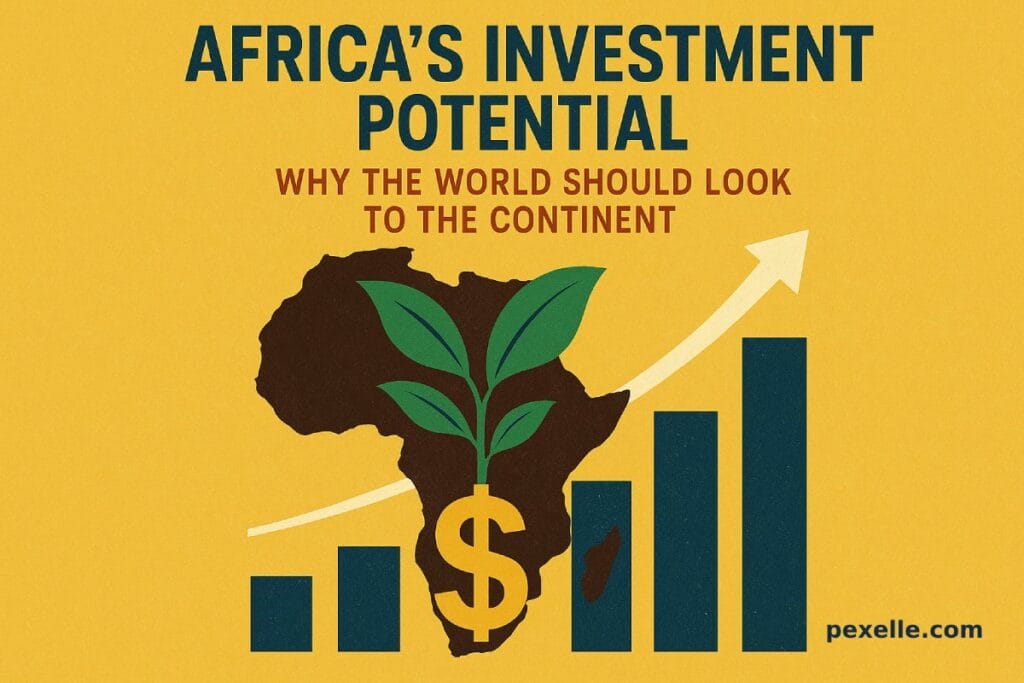Africa’s Investment Potential: Why the World Should Look to the Continent

Africa, often referred to as the last frontier of global economic growth, holds immense potential for international investors. With its youthful population, abundant natural resources, improving governance, and rapid digital transformation, Africa is not only a land of untapped opportunities but also a strategic partner for global growth and sustainability. As the world looks to diversify supply chains and foster inclusive growth, Africa emerges as a compelling destination for investment across multiple sectors.
1. Demographic Dividend and Human Capital
One of Africa’s greatest strengths lies in its people. By 2050, Africa is projected to be home to over 2.5 billion people, with 60% of its population under the age of 25. This demographic trend creates a unique opportunity: a large, young, and increasingly educated workforce that can drive innovation, production, and consumption. Countries like Nigeria, Ethiopia, and Kenya are already witnessing the rise of tech-savvy youth who are building startups, launching fintech platforms, and participating in the global digital economy.
🌍 Africa’s youth represent both a market and a labor force for future industries.
2. Natural Resources and Green Energy Potential
Africa possesses 30% of the world’s mineral reserves, including vital elements like cobalt, lithium, rare earths, and platinum — all critical for the global transition to green energy. Additionally, the continent holds enormous potential in solar, wind, and hydro power, especially in countries like Morocco, Egypt, South Africa, and Kenya. These assets not only position Africa as a key player in the renewable energy transition but also attract ESG-focused investments and partnerships.
- Key Sectors: Mining, Renewable Energy, Battery Manufacturing
- Notable Resource Hubs: DRC (cobalt), Namibia (uranium), South Africa (platinum), Mozambique (natural gas)
3. Agriculture and Food Security
With over 60% of the world’s uncultivated arable land, Africa has the potential to become the breadbasket of the world. Investment in agritech, irrigation infrastructure, sustainable farming practices, and logistics can transform Africa into a major food exporter. Moreover, by addressing food insecurity domestically and across regions, Africa can also stabilize markets and reduce dependency on imported grains.
🌾 Agricultural transformation in Africa benefits global food systems and enhances resilience to climate shocks.
4. Infrastructure and Urbanization Opportunities
Africa’s rapid urbanization is generating demand for transport systems, housing, logistics, and smart city solutions. By 2040, it is estimated that Africa will need over $130 billion annually in infrastructure investment. From building ports and roads to digital infrastructure and data centers, the scope is vast and aligns with global investors’ interests in long-term returns.
- Target Sectors: Construction, Telecom, Real Estate, Fintech
- Emerging Urban Hubs: Kigali, Nairobi, Accra, Lagos
5. Digital Transformation and Innovation Ecosystems
Africa is leading a mobile-first revolution, with millions of people accessing the internet for the first time via smartphones. This has sparked innovation in mobile banking, health tech, e-commerce, and blockchain applications. Countries like Rwanda, Ghana, and Tunisia are actively investing in innovation hubs, digital ID systems, and e-governance, creating fertile ground for foreign venture capital and technology firms.
📱 The rise of tech ecosystems like Silicon Savannah (Kenya) signals Africa’s readiness for a digital leap.
6. Strategic Trade and Geopolitical Importance
The establishment of the African Continental Free Trade Area (AfCFTA) — the largest free trade area in the world by number of participating countries — is a game-changer. It unlocks a single market of over 1.4 billion people, reduces trade barriers, and facilitates cross-border investment. Africa’s position between major shipping lanes also makes it strategically vital for global logistics and manufacturing.
Conclusion: A Shared Future of Growth
Investing in Africa is not just about capitalizing on growth — it is about co-creating sustainable, inclusive economies that benefit both the continent and the world. As global priorities shift toward resilience, green development, and digital connectivity, Africa offers not only the resources and labor but also the vision and ambition to become a cornerstone of the global economy.
Source : Medium.com




